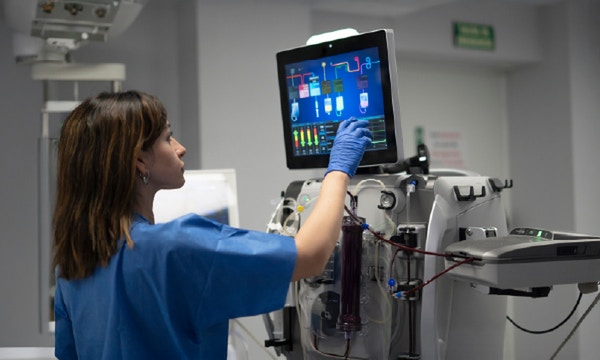Key takeaways
- GenAI can streamline documentation, analytics, and patient engagement, when powered by quality, interoperable data
- Cloud choices (SaaS versus sovereign) determine speed-to-value, control, security and data residency
- Near term: Ambient scribing and messaging; mid-term: self-serve analytics; long term: multimodal decision support
- Safe scale requires governance, HIPAA/GDPR compliance, clinician-in-the-loop and cybersecurity-by-design
- Prove ROI with unit metrics (cost per note/message, minutes saved) and clinical baselines
The integration of artificial intelligence (AI) and Generative AI (GenAI) into the healthcare industry introduces countless possibilities for improving patient care and outcomes. GenAI has the potential to revolutionize the way healthcare professionals gather and analyze data for diagnosis and treatment.
According to a December 2023 Gartner Healthcare Provider Research Panel survey, 84% of healthcare provider executives believe large language models (LLMs) — the foundation of GenAI — will have a significant (35%), transformative (37%) or disruptive (12%) impact on the healthcare industry overall.
However, several barriers exist on both the vendor and user sides that must be overcome for its successful implementation.
This article will delve deeper into the potential impact of GenAI on healthcare, exploring key challenges and detailing its short-term, mid-term and long-term applications.
What is Generative AI in healthcare?
Generative AI uses large models to create useful clinical and operational outputs from health data to assist care and administration.
Unlike traditional ML, which mainly predicts labels/scores from engineered features, GenAI synthesizes new content, explains reasoning with citations and converses in natural language.
Unlocking the power of data
One of the key challenges facing GenAI in healthcare is the availability of quality data. While healthcare generates vast amounts of data, much of it is not suitable for AI analysis. Historically, data collection in healthcare has been driven by current use cases, rather than for AI. As a result, efforts must be made to collect and curate data specifically tailored to support AI use cases. By gathering and refining accurate and representative data, healthcare professionals can maximize the potential of GenAI in delivering accurate diagnoses and treatments.
AI-ready health data means clinically curated, documented for provenance, de-identified where appropriate, labelled/linked and continuously quality-checked. Establish completeness, accuracy, missingness monitors, validate demographic and clinical coverage to minimize bias and add drift detection on key features and outcomes. An example metric is: reduce % missing vitals from 22% to 3% quarter-over-quarter before training.
Development, IoT data and security barriers
In addition to data challenges, the implementation of GenAI requires a significant development and effort barrier. To maximize the potential of AI, automated data collection from Internet of Things (IoT) devices is necessary, replacing the manual data input often still used. Real-time data collection facilitated by IoT devices can provide continuous and accurate patient information for AI analysis, enabling healthcare professionals to make better-informed decisions.
Furthermore, cybersecurity is a paramount concern in healthcare, as it is one of the most targeted industries for cyberattacks. To address this, cybersecurity vendors are now focusing on securing AI solutions by design, with healthcare-specific areas in data centers and compliance with data privacy regulations in mind. This ensures that patient data remains protected while GenAI technologies are utilized to improve healthcare outcomes.
Despite these challenges, the December 2023 survey revealed that most healthcare organizations (78%) are formally assessing use cases, while 66% are developing the ethics and policies for appropriate use and 47% are funding initiatives.
The role of cloud computing in GenAI for healthcare
“GenAI holds the key to unlocking a new era in healthcare, where data-driven insights pave the way not only driving improved health outcomes, but also enhance patient engagement and supercharge the administrative and operational value chain supporting patient care,” says Shrikanth Shetty, Chief Growth Officer, Life Sciences and Healthcare at HCLTech.
The utilization of GenAI in healthcare relies heavily on cloud computing. Software-as-a-Service (SaaS) solutions allow for the scalable deployment of AI models while ensuring data privacy regulations are abided by. Additionally, sovereign clouds may be employed to further enhance data protection and security. Leveraging the power of cloud, healthcare organizations can access AI technologies on demand and efficiently process and analyze large volumes of data, enabling more accurate and personalized patient care.
Choosing SaaS versus sovereign cloud
SaaS (managed GenAI platforms)
- Pros: Fastest deployment, lower upfront cost, vendor-managed security/patching and rapid feature updates
- Cons: Tighter data-residency constraints, less customization/control, integration limits and risk of vendor lock-in
Sovereign cloud (regionalized, tenant-controlled)
- Pros: Strong residency/control, deeper customization and easier alignment with national regulations and public-sector buyers
- Cons: Greater setup/ops burden, slower iteration, higher TCO and requires skilled cloud/ML teams
Short-term use cases of GenAI: NLP, ambient AI scribing and automation
In the short term, the implementation of GenAI in healthcare has already shown promising results. Natural Language Processing (NLP), a field within AI that focuses on teaching machines to understand human language, is a leading area of development. ChatGPT, the AI engine excelling in NLP, can be integrated into healthcare settings, enabling functions such as ambient scribing to reduce the burden on clinical documentation. This technology facilitates real-time digital note-taking during patient consultations, alleviating the administrative burden on healthcare professionals.
According to the December 2023 survey, 16% are currently implementing or have implemented an Ambient AI Scribe, while 14% are planning to implement it in the next six months and 15% in the next six to 12 months.
Furthermore, automated consumer messaging, clinical message auto-reply and document auto-generation are being explored as additional use cases. These functionalities streamline communication between healthcare providers and patients, ultimately improving patient experience and care.
Mid-term use cases of GenAI: Natural-language data access and analytics
Looking ahead, the mid-term goals for GenAI in healthcare involve the incorporation of data science teams within hospitals. By empowering AI engines with the ability to understand natural language requests for data, healthcare professionals will no longer be reliant on IT departments to access and analyze data from multiple sources. This streamlining of the data analysis process will save time and allow for more efficient decision-making. AI-powered tools can help healthcare professionals extract relevant insights from medical records, research studies and patient-generated data, leading to more personalized and effective treatment plans.
Long-term use cases of GenAI: Multimodal diagnosis and clinical decision support
In the long term, the ultimate vision for GenAI is one in which AI becomes the doctor itself. Previous AI development has been primarily focused on pattern recognition, particularly useful in areas such as cybersecurity and early cancer detection. In some cases, the accuracy of certain cancer diagnoses has reached an impressive 98.35% with AI and machine learning.
However, GenAI expands its focus to include the language analysis of clinical diagnoses. By teaching AI engines, the language and patterns of diagnostic information, GenAI considers not only medical images but also factors like blood work and doctors' notes to make accurate diagnoses. This holistic approach to diagnosis offers healthcare professionals a comprehensive view of the patient's health and assists in formulating more individualized treatment plans.
Overcoming challenges and achieving widespread adoption
The widespread adoption of GenAI in healthcare faces challenges. The computing power required to support such technology is not yet fully understood, and the associated costs may skyrocket. This presents potential obstacles for vendors and end users alike.
However, government subsidies may play a role in offsetting these costs and encouraging the adoption of GenAI. Countries that invest in AI will likely witness significant social impact, leading to healthier and happier populations. It is important to foster collaboration between vendors, healthcare organizations and governments to address these challenges and drive the widespread adoption of GenAI.
1. Governance and Ethics
- Run pre- and post-deployment bias testing across demographics and conditions
- Maintain human oversight with clear escalation and override pathways
Enforce ethical guardrails: Prompt/output filters, citation requirements, audit trails and red-teaming
2. Regulatory and Compliance
- Map data flows to HIPAA (US) and GDPR (EU), while conducting DPIAs where required
- Prepare for the EU AI Act and relevant FDA guidance for AI/ML-enabled software
Document model lineage, training data sources, change control and post-market surveillance plans
3. Clinician adoption and trust
- Co-design with providers and embed in existing EHR/inbox workflows
- Train users; start with “clinician-in-the-loop” review and clear accountability
Measure usability, override rates and satisfaction. Iterate quickly on feedback
4. Interoperability and Standards
- Use HL7 FHIR/DICOM for exchange and preserve data portability and vendor neutrality
Version APIs and terminologies, Keep mappings transparent and testable
5. ROI and value metrics
- Track unit costs (cost per note/message), minutes saved and turnaround times
- Monitor safety KPIs: Error/override rates, near-misses and adverse-event signals
- Compare clinical baselines pre- vs. post-deployment
The future of GenAI in healthcare
The integration of GenAI into healthcare holds immense potential for transforming patient care. By leveraging advanced AI techniques and overcoming data and security challenges, healthcare professionals can harness the power of GenAI to provide more accurate diagnoses, streamline data analysis processes and ultimately improve the overall well-being of populations.
To fully realize these benefits, collaboration between vendors, healthcare organizations and governments is crucial in driving the widespread adoption of GenAI. With continuous advancements, GenAI has the capability to revolutionize healthcare and create a future where AI-based technologies work seamlessly alongside healthcare professionals, resulting in better health outcomes for all.
GenAI implementation roadmap in healthcare: From pilot to scale
- Pick one high-impact use case and a baseline cost to quantify ROI.
- Secure data, HIPAA/GDPR compliance and access controls, while establishing the clinician-in-the-loop.
- Run pilot, measure minutes saved per note and message response times.
- Fix safety issues, bias and usability, expand datasets, monitor drift and explainability.
- Scale via APIs and training, track cost/note, cost/message, error rates, uptime.
FAQs: Generative AI in healthcare
How is Generative AI used in healthcare?
Drafts clinical notes, triages messages, automates forms, summarizes records and supports decisions, with clinician review.
How does GenAI improve patient engagement?
Offers 24/7 triage and education, personalized reminders, multilingual support and faster responses, escalating when needed.
Why is data quality crucial for healthcare AI?
Poor quality or unrepresentative data drives unsafe outputs and bias. Rigorous QA and monitoring reduces risk.
How do cloud and sovereign cloud help with GenAI adoption across healthcare?
They provide scalable compute, security controls and residency options to meet compliance while accelerating delivery.
What security risks come with healthcare AI?
Data leakage, prompt/model manipulation and supply-chain risks. Mitigate with least-privilege, encryption, guardrails and audits.

 Artikel anhören
Artikel anhören



